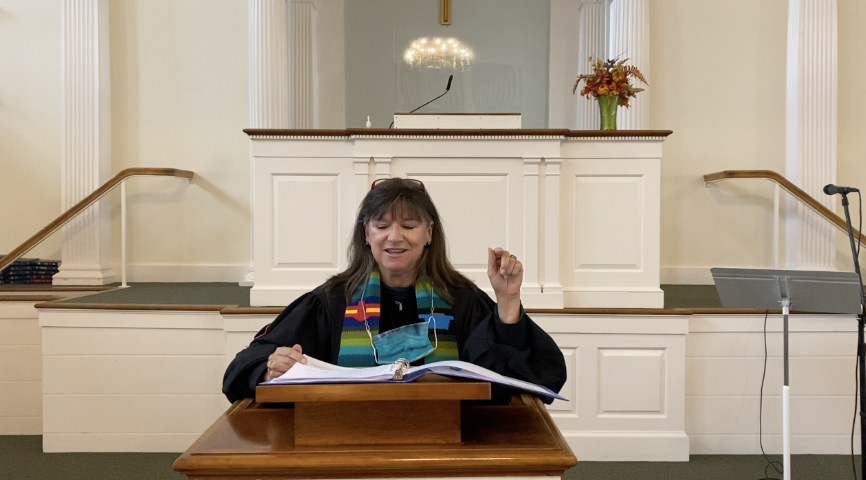We All Give God the Blues

Speaker: The Rev. Dr. Ginger Brasher-Cunningham
November 15, 2020
We all give God the blues. The rhythm and feeling of the song Laura just sang embody the power of the message: God loves everybody, but we all give God the blues. How true.
I stand in amazement every day that declarations of judgment are placed on all people in “this camp” or “that camp.” Of course, I want to be clear: I am not talking about people who spew hate or are abusive. They are not a part of this particular reflection. We will chat about them another day. This one is about us: basically good people who try to live ethically.
The scripture that Jake read and the song Laura sang have taken me back to ponder situations through the years. When I left seminary, I took with me great inspiration for the social gospel and liberation theology from Walter Rauschenbusch and Gustavo Gutiérrez. Pastoral Care and Counseling from Anton Boisen, Howard Clinebell, and Wayne Oates fed my soul. Mary Daly sparked the awareness for inclusive language, and Dietrich Bonhoeffer and Dr. King led me into justice. These people and their writings set me on a journey of understanding how to love our neighbor--neighbor being our global family.
As I was recalling lessons learned, or at least lessons taught, a seminar from someone I don’t even remember flashed in my mind. The lesson is one of the most important from those years.
80 percent of people will think you’re okay.
10 percent will think you’re great and
10 percent will not like you no matter what.
Even if we love our “enemies,” ten percent of them aren’t going to like us anyway. The idea of the text is not to be liked, but to love.
In the next few minutes we will not fully unpack the scripture, the song, equity, compassion, inclusivity, love, justice, or chemistry, but we can fold them together and put on a new outfit if you will; maybe even, as Patti LaBelle sang, a new attitude.
Standing on the bedrock of what the forenamed theologians taught me about Jesus--equity, compassion, inclusivity, love and justice--we pause to acknowledge the chemistry of relationship and the different mindsets as we wrestle in this divisive environment. In Ecclesiastes 3 we read there is a season and time for every purpose under heaven. That text includes a time to love and a time to hate, which seems to conflict with the Luke passage about loving our enemies. Naturally in teaching, hyperbole is used to emphasize--to drive the idea home.
When we say, “I have a million things to do today,” do we have a million things or just a lot of things? Or perhaps one of my dad’s favorites can clarify as well. He would say, “Growing up I had to walk two miles up a hill to school, carrying a biscuit--and in the snow.” In Alabama? Not so much, but his point was made.
Jesus suggests it is easy to love the people we like and to care about their well-being. However, it is harder to offer compassion to those we don’t like. Ecclesiastes proclaims there is a season for every purpose under heaven. What if our purpose in this struggling country, overshadowed by a pandemic and living in an election year, is to heed the call of the gospel and intentionally love the people we deem as unlikable? And how will we get there?
I am talking about more than “civility” or placating people. I am not talking about refraining from seeking justice. Our focus is on people who just don’t understand each other. People who don’t get why this value or principle is more important to this person and another value and principle is important to that person. How do we live life in each autumn, winter, spring, and summer as a season love?
First, we focus on our own spiritual health and development. Recently I was re-reading some of my favorite books. One was Sermons by Peter Gomes. When living in Boston, I was fortunate to hear him reflect on life and scripture. With a striking voice and interesting gestures, he could invite one into a story. One sermon text he used was a sentence from Luke: “And Jesus increased in wisdom and in stature and in favor with God and humankind.” Noting that we know little we know about Jesus between infancy and adulthood, he proposed that Jesus did not just grow older, but he grew wiser. He put it like this: “Christian growth is not simply a matter of time, however, but the quality of that time that we call maturity.
I believe during these days we have matured. We have been creative in contacting and connecting with others. We have been mindful of time with family. Some have looked at spending patterns. Others have invested in historically Black colleges, worked on promoting a more inclusive historical view, and Venmoed those in the food industry or entertainment business who have been furloughed. This season of unpredictable twists and turns has taught us from a Zoom lens that many are food insecure, that people need to feel connected, that we are a long way from an equitable country, and that somehow along the way, we have tempered our sense of compassion for one another.
Yes, we all give God the blues, but we can work on that! In the early 1990s, when Rev. Yvette Flunder founded City of Refuge Church, she said the purpose was to open the doors to everyone. It seems right now--in this season we deem love--we the wider Church, we the people of the Church, are called to open the doors of our hearts to love everyone in the name of the compassionate and grace-giving Christ.
Go fling the doors open, remembering that God loves everybody and we can too . . .
Amen.
